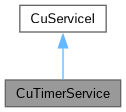The CuTimerService class provides access to cumbia timers. It is normally used internally by the library. More...
#include <cutimerservice.h>

Public Member Functions | |
| CuTimerService () | |
| Class constructor Initializes timerMaxCount to 25. | |
| ~CuTimerService () | |
| CuTimer * | registerListener (CuTimerListener *timer_listener, int timeout, CuEventLoopService *loop_service=nullptr, const std::string &tmrname=std::string()) |
| Register a new CuTimerListener with a given timeout. Reuse existing timers if possible. Listeners shall be notified in the event loop thread if the method is called with a non null reference to CuEventLoopService, in the CuTimer's thread otherwise. | |
| void | unregisterListener (CuTimerListener *th, int timeout) |
| Unregister a listener with the given timeout from the service. | |
| CuTimer * | changeTimeout (CuTimerListener *th, int from_timeo, int to_timeo) |
| Changes the timeout of the timer that serves the given listener. | |
| void | schedule (CuTimer *t) |
| void | restart (CuTimer *t) |
| restart the timer t with interval millis | |
| void | start (CuTimer *t) |
| start the timer | |
| std::list< CuTimer * > | getTimers () const |
| returns the list of timers | |
| std::list< const CuTimerListener * > | getListeners (const CuTimer *t) const |
| std::string | getName () const |
| Returns the name of the service. | |
| CuServices::Type | getType () const |
| CuTimerService::getType returns the service type. | |
 Public Member Functions inherited from CuServiceI Public Member Functions inherited from CuServiceI | |
| virtual | ~CuServiceI () |
Detailed Description
The CuTimerService class provides access to cumbia timers. It is normally used internally by the library.
CuTimerService implements CuServiceI in order to provide access to CuTimer objects. They are not directly available to clients. Use registerListener to either get a timer. Timers are shared across all listeners registered with the same timeout. unregisterListener is called when a timer is no more needed. CuTimer is single shot: CuTimerService::restart shall be called to restart the timer. It is possible to get the list of CuTimerListener for a given timer and the list of all timers.
Constructor & Destructor Documentation
◆ CuTimerService()
| CuTimerService::CuTimerService | ( | ) |
Class constructor Initializes timerMaxCount to 25.
References CuTimerServicePrivate::timer_max_count, and CuTimerServicePrivate::tmrcnt.
◆ ~CuTimerService()
| CuTimerService::~CuTimerService | ( | ) |
References CuTimerServicePrivate::ti_cache, and CuTimerServicePrivate::ti_map.
Member Function Documentation
◆ changeTimeout()
| CuTimer * CuTimerService::changeTimeout | ( | CuTimerListener * | tl, |
| int | from_timeo, | ||
| int | to_timeo ) |
Changes the timeout of the timer that serves the given listener.
- Parameters
-
tl the CuTimerListener requiring a change in timeout timeout the new timeout, in milliseconds
- Returns
- A fresh or existing timer satisfying the requirements in terms of timeout.
- Note
- Internally, unregisterListener and registerListener are called
References perr, registerListener(), CuTimerServicePrivate::shmu, CuTimer::timeout(), and unregisterListener().
◆ getListeners()
| std::list< const CuTimerListener * > CuTimerService::getListeners | ( | const CuTimer * | t | ) | const |
References CuTimerServicePrivate::shmu, and CuTimerServicePrivate::ti_cache.
◆ getName()
|
virtual |
◆ getTimers()
| std::list< CuTimer * > CuTimerService::getTimers | ( | ) | const |
returns the list of timers
- Returns
- std::list with all the currently registered timers
References CuTimerServicePrivate::shmu, and CuTimerServicePrivate::ti_map.
◆ getType()
|
virtual |
CuTimerService::getType returns the service type.
- Returns
- CuServices::Timer
Implements CuServiceI.
References CuServices::Timer.
◆ registerListener()
| CuTimer * CuTimerService::registerListener | ( | CuTimerListener * | tl, |
| int | timeout, | ||
| CuEventLoopService * | loo_s = nullptr, | ||
| const std::string & | tmrname = std::string() ) |
Register a new CuTimerListener with a given timeout. Reuse existing timers if possible. Listeners shall be notified in the event loop thread if the method is called with a non null reference to CuEventLoopService, in the CuTimer's thread otherwise.
- Parameters
-
timer_listener a CuTimerListener (e.g. CuThread) timeout the desired timeout loop_service if specified (not null) then the timeout callback is executed in the same thread as the event loop thread (usually, the main thread).
- Since
- 1.3.0
- Parameters
-
tmrname an optional name for the timer to be created. If the timer is reused, passing a non empty tmrname will overwrite the timer name.
- Timer registration
A timer with the same timeout is reused and the listener and loop service are added to the instance.
- Note
- If the same listener is registered with another loo_s, the new one replaces the old one.
References CuTimerPrivate::m_id, CuTimerPrivate::m_name, pgreen, CuTimer::setTimeout(), CuTimerServicePrivate::shmu, CuTimerServicePrivate::ti_cache, CuTimerServicePrivate::ti_map, CuTimerServicePrivate::timer_max_count, and CuTimerServicePrivate::tmrcnt.
Referenced by changeTimeout(), and CuHLTimer::start().
◆ restart()
| void CuTimerService::restart | ( | CuTimer * | t | ) |
restart the timer t with interval millis
- Parameters
-
t the timer to restart millis the desired interval
The timer is rescheduled if a timeout is already pending
Referenced by CuHLTimer::onTimeout(), and CuThread::run().
◆ schedule()
| void CuTimerService::schedule | ( | CuTimer * | t | ) |
◆ start()
| void CuTimerService::start | ( | CuTimer * | t | ) |
start the timer
- Parameters
-
t which timer millis timeout in milliseconds
if the timer is pending, nothing is done. Timer is started otherwise.
◆ unregisterListener()
| void CuTimerService::unregisterListener | ( | CuTimerListener * | tl, |
| int | timeout ) |
Unregister a listener with the given timeout from the service.
- Parameters
-
tl the CuTimerListner to unregister timeout the to remove listener's timeout
If the timer associated to tl has no more listeners after unregistration, it will be stopped and deleted.
References pfatal, and CuTimerServicePrivate::shmu.
Referenced by changeTimeout(), and CuHLTimer::stop().
The documentation for this class was generated from the following files: